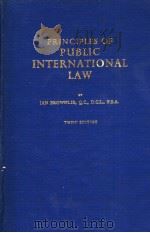《INTERNATIONAL LAW VOLUME 1 THIRD EDITION》
| 作者 | GEORG SCHWARZENBERGER 编者 |
|---|---|
| 出版 | STEVENS & SONS LIMITED |
| 参考页数 | 808 |
| 出版时间 | 1957(求助前请核对) 目录预览 |
| ISBN号 | 无 — 求助条款 |
| PDF编号 | 818860358(仅供预览,未存储实际文件) |
| 求助格式 | 扫描PDF(若分多册发行,每次仅能受理1册) |
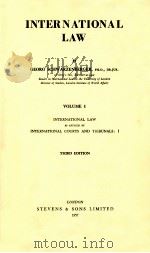
INTRODUCTION3
1. THE SUBJECT-MATTER OF VOLUMES ONE AND TWO3
2. THE INDUCTIVE APPROACH TO INTERNATIONAL LAW4
3. STANDARDS OF CRITICISM9
PART ONE THE FOUNDATIONS OF INTERNATIONAL LAW15
1. INTERNATIONAL LAw AND SOCIETY15
1. The Principles of International Law15
2. International Law and Society16
3. The Public Character of International Law17
4. The Functions of International Law17
5. The Structure of International Law18
6. Universal and Regional International Law20
7. The Development of International Law and Society Inter-Temporal Law21
2. LAW-CREATING PROCESSES AND LAW-DETERMINING AGENCIES25
1. The Distinction between Law-Creating Processes and Law-Determining Agencies25
2. The Composition and Hierarchy of the Law-Determining Agencies27
3. The Hierarchy of the Elements of Law-Determining Agencies28
4. The World Court and the Law-Creating Processes37
5. The World Court and the Law-Determining Agencies58
6. International Courts and the Development of International Law62
3. INTERNATIONAL AND MUNICIPAL LAW67
1. Conflict between International and Municipal Law68
2. Borderline Spheres between International and Municipal Law70
3.INTERNATIONAL AND MUNICIPAL LAw—ontinued72
3. The Competence of the World Court in Disputes regarding the Application of Municipal Law72
4. The Application of Municipal Law by the World Court72
5. The Conflict of Municipal Laws74
4.THE DOMAIN OF INTERNATIONAL LAW79
1. The Status of Colonial Companies80
2. The Legal Significance of Treaties concluded by Colonial Companies with Native Communities81
3. The De Facto Character of Native Communities82
4. The Object Character of Native Communities82
5. Extraterritorial Jurisdiction83
6. Interpretation of Capitulation Treaties85
PART TWO INTERNATIONAL PERSONALITY89
5.TYPICAL SUBJECTS OF INTERNATIONAL LAw89
1. Composite States89
2. Dependent States91
3. International Protectorates92
4. League Mandates and Trust Territories95
5. The Free City of Danzig109
6. The Memel Territory112
6. THE SOVEREIGNTY AND EQUALITY OF STATES114
1. The Meaning of Sovereignty in International Law115
2. Domestic Jurisdiction116
3. Presin Favour of the Independence of States119
4. The Relativity of Sovereignty121
5. Restrictive Interpretation of Limitations of Sovereignty123
6. Independence and Equality of States125
7. RECOGNITION127
1. The Principle of Recognition127
2. Facets of Recognition130
8. NON-TYPICAL SUBJECTS OF INTERNATIONAL LAW137
1. The International Personality of International Institutions137
2. The Place of the Individual in International Law139
3. Non-Identity of State Claims and Claims of Individuals140
4. Individuals as Beneficiaries of International Treaties142
5. Public Contracts146
6. War Criminals153
9. INTERNATIONAL REPRESENTATION156
1. Necessary Representation157
2. Legal Significance of Representation157
3. The Position of Members of the League Council160
4. International Agency160
10. CONTINUITY AND DISCONTINUITY OF INTERNATIONAL PERSONALITY163
1. The Relativity of the Continuity and Discontinuity of International Personality164
10.CONTINUITY AND DISCONTINUITY OF INTERNATIONAL PERSONALITY—continued166
2 Territorial Changes and International Judicial Practice166
3. Cession of Territoty and State Property167
4. Cession of Territory and the Continuation of the Former Civil Law170
5. Cession of Territory and Respect for Private Rights171
6. Cession of Territory and State Debts175
7. The Absorption of States and Tortious Liability175
8. Subrogation and Treaties176
9. International Judicial Institutions and the “Principle" of State Succession179
PART THREE STATE JURISDICTION183
11.FORMS OF STATE JURISDICTION183
1. State Sovereignty and Territorial Jurisdiction184
2. The Exercise of Territorial Jurisdiction186
3. Personal Jurisdiction188
4. Extraordinaty Jurisdiction190
12TERRITORIAL JURISDICTION IMMUNITIES AND LIMITATIONS UNDER INTERNATIONAL CUSTOMARY LAw192
1. Diplomatic and Consular Immunities and Privileges192
2 Limitations of Territorial Jurisdiction Over the Territorial Sea and National Waters194
3. Limitations in Favour of Foreigners: The Minimum Standard of International Law200
13.TERRITORIAL JURISDICTION LIMITATIONS UNDER INTERNATIONAL CONVENTIONAL LAW:Ⅰ—The Freedoms of Fisheries and Navigation208
1. General Problems208
2. Freedom of Fisheries in National Waters and the Terri-torial Sea214
3. Freedom of Inland Navigation216
4. Freedom of Navigation on Inter-Oceanic Canals223
5. Freedom of the Air226
14.TERRITORIAL JURISDICTION LIMITATIONS UNDER INTERNATIONAL CONVENTIONAL LAwⅡ—International Economic Law and International Labour Law229
1. International Economic Law231
2. International Labour Law252
15.TERRITORIAL JURISDICTION LIMITATIONS UNDER INTERNATIONAL CONVENTIONAL LAW:Ⅲ—International Criminal Law254
1. State Sovereignty and Criminal Jurisdiction254
2 The Meanings of International Criminal Law255
15.TERRITORIAL JURISDICTION—COntinued LIMITATIONS UNDER INTERNATIONAL CONVENTIONAL LAw continued256
3. Extradition256
4. Diplomatic Asylum260
5. Genocide271
16.TERRITORIAL JURISDICTION LIMITATIONS UNDER INTERNATIONAL CONVENTIONAL LAWⅣ—Limitations in Favour of Minorities273
1. The Functions of Minority Treaties274
2. Governing Principles275
3. Interpretation of Minorities Treaties275
4. Nationality and Minority Status276
5. The Test of Minority Status277
6. The Substance of Minority Rights278
7. The Protection of Minority Rights281
8. The Transfer of Minorities283
PART FOUR OBJECTS OF INTERNATIONAL LAW289
17.TERRITORY289
1. In Quest of the Rules on Title to Territory289
2. The Problem in Historical Perspective291
3. The Rules Governing Title to Territoty294
18.LAND FRONTIERS310
1. The Legal Function of Frontiers310
2. International Delimitation of Frontiers311
3. Considerations Governing the Delimitation of Frontiers313
19.MARITIME FRONTIERS317
1. The Maritime Frontier between Contiguous States317
2. National Waters and the Territorial Sea318
3. Bays327
4. Islands335
20.THE HIGH SEAS338
1. Exclusive Jurisdiction of the Flag State338
2. Exceptions to the Exclusive, Jurisdiction of the Flag State341
3. The Impact of Status Mixtus and War on the Freedom of the Seas347
4. The Rights of User of the High Seas348
5. The Prohibition of Exclusive Jurisdiction over the High Seas and the Problem of the Continental Shelf349
6. The Character of the Rules Governing the Principle of the Freedom of the Seas352
21. INDIVIDUALS354
1. Significance of Nationality354
2. The Rules Governing Nationality357
3. Dual Nationality362
4. Naturalisation367
21. INDIVInuALs—continued372
5. Collective Naturalisation and the Right of Option372
6. Loss of Nationality375
7. The Meaning of Ressortissant377
8. Nationality of the Inhabitants of Dependent States and Territories under International Regimes378
9. Proof of Nationality381
10. Tests Other than Nationality385
22.CORPORATIONS AND SHIPS387
1. The Rules Governing the Allocation of Corporations388
2. The Tests for the Allocation of Corporations as Applied in International Judicial Practice391
3. The Allocation of Ships to Sovereign States412
4. The Nationality of Corporations and Ships in International Law418
PART FIVE INTERNATIONAL TRANSACTIONS421
23.INTERNATIONAL TREATIES:Ⅰ—The Meaning and Functions of Treaties421
1. The Meaning of Treaties421
2 The Functions of Treaties422
3. Treaties and the Problem of an International Public Order425
24.INTERNATIONAL TREATIES:Ⅱ—The Conclusion of Treaties428
1. The Scope of the Treaty-Making Power428
2 Optional Character of Formal Requirements430
3. The Formal Requirements of Written Treaties431
4. The Border Line between Incomplete International Engage-ments and Treaties439
25.INTERNATIONAL TREATIESⅢ—Legal Effects of Treaties446
1. Legal Effects Inter Partes446
2 Legal Effects on Non-Parties458
26.INTERNATIONAL TREATIESⅣ—The Conflict of Treaties472
1. Maxims and the Conflict of Treaties472
2. The Governing Rules474
3. The Conflict of Treaties and International Judicial Institu-tions477
27.INTERNATIONAL TREATIESV—Interpretation : General Problems488
1. The Scope and Effects of Treaty Interpretation488
2. The Rules Governing Treaty Interpretation491
3. The Function of the Techniques of Treaty Interpretation494
28.INTERNATIONAL TREATIES:Ⅵ—Techniques of Interpretation498
1. Summary Interpretation498
2. Literal Interpretation501
3. Systematic Interpretation505
4. Logical Interpretation508
5. Historical Interpretation514
6. Functional Interpretation517
7. Authoritative Interpretation531
29.INTERNATIONAL TREATIES:Ⅶ—Revision and Termination of Treaties533
1. The Revision of Treaties533
2. The Suspension and Termination of Treaties534
30.UNILATERAL ACTS548
1. Types of Unilateral Acts548
2. The Legal Characteristics of Unilateral Acts550
3. The Interpretation of Unilateral Acts554
4. Parallel and Collective Acts559
31.INTERNATIONAL TORTS:Ⅰ—International Responsibility562
1. The Basic Rules562
2. The Legal Foundation564
3. Forfeiture of Claims by Acquiescence (Extinctive Prescrip-tion)565
32.INTERNATIONAL TORTS:Ⅱ—The Breach of International Obligations571
1. The Meaning of Breachof International Obligations572
2. The Breach of Other than International Obligations576
3. The Meaning of International Tort581
4. Types of International Torts582
33.INTERNATIONAL TORTSⅢ—The Legal Interest of the Claimant584
1. Legal Interest in Municipal and International Law584
2. Legal Interest in Tortiously Relevant Acts Against Subjectsof International Law585
3. Legal Interest in Tortiously Relevant Acts Against Objects of International Law589
4. The Nationality of Claims590
5. The Exhaustion of Local Remedies602
34.INTERNATIONAL TORTS:Ⅳ—Identity of the Tortfeasor613
1. The Legislature614
2. The Executive615
3. The Judiciaty619
4. Dependent States624
5. Provinces and Municipalities625
34.INTERNATIONAL ToRTs—continued627
6. Revolutionaries627
7. Individuals630
35.INTERNATIONAL TORTS:Ⅴ—The Requirement of Fault632
1. The Practice of the World Court632
2. The Practice of Arbitral Tribunals634
3. The Limits of Tortious Liability641
4. The Subjective Element of International Responsibility and the Fundamental Principles of International Law646
36.INTERNATIONAL TORTS:Ⅵ—Reparation653
1. Meaning and Object of Reparation654
2. The Forms of Reparation656
Selected Bibliography683
Index777
1957《INTERNATIONAL LAW VOLUME 1 THIRD EDITION》由于是年代较久的资料都绝版了,几乎不可能购买到实物。如果大家为了学习确实需要,可向博主求助其电子版PDF文件(由GEORG SCHWARZENBERGER 1957 STEVENS & SONS LIMITED 出版的版本) 。对合法合规的求助,我会当即受理并将下载地址发送给你。
高度相关资料
-

- THIRD PARTIES IN INTERNATIONAL LAW
- 1993 CLARENDON PRESS·OXFORD
-
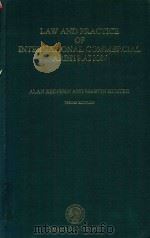
- Law and Practice of International Commercial Arbitration Third Edition
- 1999 Sweet & Maxwell
-

- THE LAW OF INTERNATIONAL INSTITUTIONS THIRD EDITION
- 1975 STEVENS & SONS
-

- CONSTRUCTION LAW THIRD EDITION
- 1981 SWEET & MAXWELL
-

- Criminal law third edition
- 1990 West Publishing co.
-

- UROLOGY VOLUME 1 THIRD EDITION
- 1970 W.B.SAUNDERS COMPANY
-

- DERMATOLOGY VOLUME 1 THIRD EDITION
- 1992 W.B.SAUNDERS COMPANY
-

- GASTROENTEROLOGY VOLUME 1 THIRD EDITION
- 1974 W.B.SAUNDERS COMPANY
-
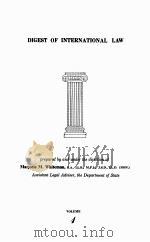
- DIGEST OF INTERNATIONAL LAW VOLUME 1
- 1963 DEPARTMENT OF STATE PUBLICATION
-
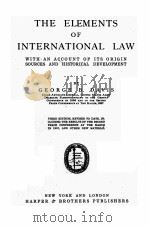
- THE ELEMENTS OF INTERNATIONAL LAW THIRD EDITION
- 1908 HARPER AND BROTHERS PUBLISHERS
-
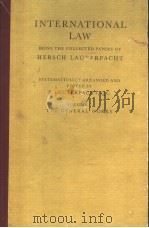
- INTERNATIONAL LAW VOLUME 1
- 1970 CAMBRIDGE UNIVERSITY PRESS
-
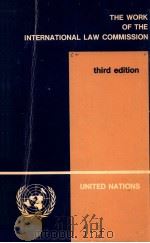
- THE WORK OF THE INTERNATIONAL LAW COMMISSION THIRD EDITION
- 1980 UNITED NATIONS
-

- The international pharmacopoeia third edition volume 4
- 1994 World Health Organization
-
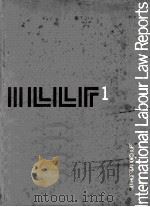
- INTERNATIONAL LABOUR LAW REPORTS VOLUME 1
- 1978 SIJTHOFF & NOORDHOFF
提示:百度云已更名为百度网盘(百度盘),天翼云盘、微盘下载地址……暂未提供。➥ PDF文字可复制化或转WORD
